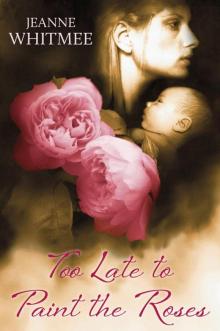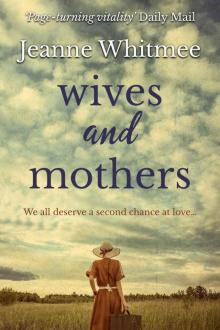- Home
- Jeanne Whitmee
Too Late to Paint the Roses
Too Late to Paint the Roses Read online
Too Late to Paint
the Roses
Jeanne Whitmee
For Matthew, Ellie, Jamie and Rick
Contents
Title Page
Dedication
Prologue
One
Two
Three
Four
Five
Six
Seven
Eight
Nine
Ten
Eleven
Twelve
Thirteen
Fourteen
Fifteen
Sixteen
By the Same Author
Copyright
Prologue
Manoeuvring his baby grand piano out of the tiny cottage where it had lived for most of its life and into a removal van was something Ian had been dreading. Now he watched apprehensively as the two burly men huffed and puffed, heaving and groaning until at last the body of his precious instrument was safely stowed inside the van. I touched his arm.
‘Don’t worry. They assured me they’d shifted pianos before.’
Ian sighed and ran a hand through his already tousled hair. ‘I hope you’re right. The first thing I’ll have to do is get it tuned. God only knows how much damage all that shaking up is doing. Perhaps we should have got that specialist firm in after all.’
‘I did get a quote,’ I reminded him. ‘Have you forgotten how much they were asking? And that was just for removing the piano.’
‘I know, I know.’ Ian sighed. ‘We’ll just have to hope for the best I suppose.’
Having safely stowed the piano’s body into the van, the men were walking back to the cottage, shiny red faces beaming good-naturedly. ‘Okay, guv’ner,’ the one called Shane said. ‘Just gotta get the legs in now and we’re all done and dusted – ready for the off.’
Ian watched apprehensively as the piano’s bulbous legs, lovingly wrapped in felt and bubble wrap, were wedged into a corner. ‘You’re sure nothing will fall on it? The piano, I mean,’ he said.
The men exchanged an indulgent glance. ‘Don’t you worry about a thing, mate,’ the tallest one said. ‘We done this a hundred times or more and never had no casualties yet.’
‘There’s always a first time,’ Ian muttered under his breath as he turned away.
Shane was closing the van doors and securing them. ‘Right,’ he called out as he climbed into the driving seat. ‘Beaumont House, 16 Wellington Avenue – right?’
‘Right,’ I called. ‘We’ll see you there.’ I slipped a hand through Ian’s arm and squeezed it as the van moved off. ‘Do cheer up, darling. Everything’s going to be fine. Just think of all that lovely space we’re going to have. Come on, get in the car. I’ve packed some sandwiches and a flask.’ I put Jamie’s violin in its case on the back seat of the car next to Ian’s and fastened the seat belt round it but as I joined Ian in the car I caught sight of the troubled look on his face and reached across to kiss him. ‘Don’t look like that. It’s all going to be fine. This is the first day of the rest of our lives, remember, so let’s enjoy it.’
The moment I’d seen Beaumont House I’d fallen in love with it. A five minute walk from the seafront, it had been built at the turn of the twentieth century as a large family home, but later used as a guest house. On the ground floor there were three reception rooms, a large kitchen and six bedrooms on the two floors above. Ian had immediately declared it too large.
‘It’s far too large. We’d rattle around in it. There are only three of us, remember,’ he’d pointed out. ‘We don’t really need all those rooms.’
But a month later our situation had changed dramatically. Unforeseen circumstances made what had seemed like a pipe dream possible. Our casual efforts to upsize suddenly became necessity and Beaumont House fitted the bill perfectly.
When we drew up outside our new house the removal van was already there.
‘Hi there!’ I called to the removal men. ‘Sorry for the delay. We had to pick up the key from the estate agent’s.’
Shane jumped down from the driving seat, brushing crumbs from his chin and T-shirt. ‘S’all right, missis, we took advantage of the delay to eat our sarnies.’ He looked at Ian. ‘I ’spect you like us to unload the Joanna first, eh, guv’?’
Ian grinned in spite of himself. ‘That would be great,’ he said. ‘Just let me unlock the door and I’ll show you where it has to go.’
He had chosen the smallest of the three ground floor rooms, the one nearest to the front door, as his studio. It would be the most convenient room in which to teach his pupils. He watched anxiously as Shane and his mate carried the piano in, reattached the legs and set it up near the window where he wanted it. Shane wiped his forehead and looked at Ian. ‘Right. Gonna give us a tinkle then?’ he asked with a cheeky grin. ‘Just to make sure we ain’t broke nuthin’?’
‘I’m sure everything’s fine but I think we’ll give her time to settle down first,’ Ian told him.
‘She! Blimey! You’d think it was a bird,’ Shane said with a grin. ‘I’ve seen blokes treat their wives worse!’
The piano was quickly joined by Ian’s desk, his CD player and recording equipment and the cabinets in which he kept his music.
Once the removal men had gone we sat on upturned boxes and ate the lunch I’d packed. Seeing that he was itching to unpack his collection of music and CDs and rearrange everything I left him to it, closing the door of the new studio and standing in the hall to breathe in the atmosphere of our new home.
The hall was what had first attracted me to the house. It was wide and spacious with an elegant staircase leading up to the first landing. At the top of the stairs was a large window with lozenge shaped panes of pink and green stained glass. When the sun reached that side of the house in the afternoon it lit up the window, bathing the whole of the hall and landing in soft pastel colour. That was how we had first seen it and although Ian had laughed at me, I had the warm feeling that the house was welcoming us. In spite of the promised changes to our family situation we were going to be happy here. I just knew it.
I worked hard all afternoon, unpacking enough to make us comfortable for our first night. I loved the big kitchen with its Aga standing in a tiled recess and the built-in dresser. By four o’clock I had washed and put away all our crockery and as I put the last of the saucepans into a cupboard a sudden ring at the front door bell made me look at my watch.
‘That must be Jamie,’ I told myself hurrying through the hall to let my son in. Jamie was standing in the porch when I opened the door. I laughed, taking in his uncertain expression as he stood in the doorway.
‘You don’t have to ring the bell, you live here!’
He grinned shamefacedly. ‘I s’pose I’ll get used to it eventually,’ he said. ‘It’s a lot nearer school – I won’t have to get up so early in the mornings. I nearly got on the bus to go to Mableton Park.’
‘Well, thank goodness you didn’t!’
‘The piano survived the journey then?’ he observed, his head on one side as he heard Ian running his hands experimentally over the keys. ‘Is my violin still in one piece?’
‘Of course it is,’ I laughed. ‘Everything’s in one piece. Pop in and see the new studio if you like. Tea will be ready in about ten minutes. Only makeshift I’m afraid.
He looked at me. ‘I suppose we couldn’t have a takeaway, could we – pizza?’
‘Okay, if you like.’
His face lit up as he shouldered off his satchel and dropped it on the floor. ‘Wow, wicked! I’m so hungry I could eat an elephant. School dinner was rubbish as usual.’
I went back into the kitchen, telephoned for the pizza and began to lay the table, pausing to look o
ut of the window, my attention suddenly caught by the climbing rose on the front porch. In a few months’ time it would be a mass of tumbling blooms. I was reminded, suddenly, of other roses, tumbling over a Cornish wall, one summer all those years ago. I’d been so young and carefree then, happily unaware of the difficult decisions and the heartache that was to come. I paused, praying silently that this new home would bring us good luck and happiness.
One
1997
By the time I left school I was well used to being a disappointment so when I announced that I wanted to make catering my career my mother’s displeasure came as no surprise.
From the day I started school it had been made clear to me that she expected no less than that I should be studious and academic, eventually go to university and follow her into the teaching profession. I had let her down at every turn. And she never let me forget it.
Her disappointment in me wasn’t only in my failure to live up to her expectations. I had committed the sin of being born a girl and not the son she had wanted so badly. Added to that, my birth had been difficult and complicated, leaving her unable to have more children and I had always been made to feel that I was somehow responsible for that too.
No real rapport ever developed between Mother (never Mummy) and me. Year after year, however hard I tried, my school reports met with disapproving frowns. As a mother she was not harsh but there was always a coolness, an impenetrable barrier that had kept me at arms’ length. It was as though she could never quite separate her head teacher persona from motherhood.
Dad on the other hand was made of much softer stuff. It had always been Dad who sneaked upstairs to read me a bedtime story or stroked my brow when I wasn’t well; Dad who covered up my small misdemeanours and shared my secret dreams.
As the years went by Mother grew even more remote and unbending. She was especially dismissive when I started secondary school and showed an aptitude for domestic science rather than history and English, which had been her own forte. Even taking extra classes in bookkeeping did not impress her, but Dad argued that a child should be allowed to follow what he or she had a talent for and wanted to do. It would be useless trying to push me into a mould I didn’t fit. Needless to say, he got the blame when my interest in domestic science persisted.
When I wanted to study it further after A levels rather than try for a university place she was clearly appalled. It was unthinkable that a daughter of hers should perform what she referred to as ‘menial tasks’ for a living. But eventually she washed her hands of the whole argument and resignedly accepted my decision to study for a career in catering. To her I was a lost cause.
Greencliffe was a seaside resort on the south coast. The town’s only college ran courses in various types of catering and hotel management. I opted for a catering diploma. I had the right qualifications from school and it sounded interesting. Without actually going abroad it could hardly have been further from home and I secretly welcomed the distance it would put between Mother and me. I also looked forward to shaking off the constraints and inhibitions she imposed and enjoying the independence I would have away from the stuffy atmosphere of home.
As there were no halls of residence at Greencliffe College of Further Education I applied for a bedsit I saw advertised in the college newsletter. It was in the house of a mature student, about to join the same catering course as me. I wrote to the address given, enclosing references from my headmistress and the kindly local GP, and to my delight I received a letter by return to say that the room was mine. I was on my way!
But when I actually arrived I found Greencliffe very different from the windswept Yorkshire village where I’d grown up. This seaside town on the fringe of the New Forest had a totally different feel to it. The people were different too. I found to my dismay that I missed Dad and home much more than I’d expected to.
Feeling very much the new girl, I felt out of my depth and desperately lonely in those first weeks. I found an evening job in a hotel bar but the other members of staff seemed aloof and unfriendly and looked askance at me when they heard my northern accent, often perversely pretending not to understand what I said. I vowed to rid myself of it as soon as possible but the more I tried the worse it seemed to get. Halfway through that first term I was so miserable and disillusioned that I was on the point of giving up and going home, and if it hadn’t been for my landlady my whole future might have turned out to be very different.
Mary Sullivan was a lively young widow of thirty-five. Her bright green eyes and unruly red hair endeared her to me from the start. She was warm and friendly and almost at once I felt I had known her all my life. Her husband had been tragically killed in a car accident, leaving her with a three bedroom semi on which there was still a mortgage. She confided in me that she was hoping to get a diploma in catering so that she could start her own business.
‘Sure, it’s a long way off though,’ she sighed. ‘Looking at things realistically I’ll have to get a job in a hotel and work at paying off the mortgage for a few years before I can set up on my own.’ She smiled her enthusiastic smile. ‘Still, what would life be without a dream, eh? We all need something to work towards.’
When she knocked on my door one evening and found me in tears she reacted with her natural warmth.
‘Ah, what’s wrong, love?’ She came into the room and sat beside me on the bed, slipping a motherly arm around my shoulders. Her kindness was all that was needed to unleash a fresh torrent of tears as I poured out my loneliness and disillusionment.
‘There now, don’t I know just how you feel,’ she said in her soft Irish accent. ‘When I first came over here from Ireland I was just sixteen and I felt I might just as well have dropped in from another planet. I had no friends and I felt like a freak. But I’ll tell you one thing, darlin’. I never even tried to lose my accent, no matter how much they laughed at it. I’ve never been ashamed of it and neither should you. Isn’t it who we are, after all? People who can’t see beyond a way of speaking are too shallow to bother with. You’re a lovely girl, so just be yourself. Hold your chin up and smile. They’ll soon see you for the lovely person you are.’
After that day Mary took me firmly under her wing. ‘Sure, there’s only the two of us,’ she said. ‘So where’s the sense in you sitting up there in your room alone? If you like we can take it in turns to cook, and eat together.’ Her smile vanished. ‘Ah, but maybe that’s not to your liking. Maybe you like being on your own.’
‘Oh, no! It sounds lovely,’ I assured her.
‘And as we’re taking the same course you might as well drive in to college with me in my old rattletrap of a car? Seems silly you catching the bus when I have to go anyway.’
‘Only if you let me share the petrol costs,’ I offered.
She laughed. ‘Done!’ She raised her hand to give me a ‘high five’. ‘But if you ever want to change the arrangement just you let me know,’ she went on, suddenly serious. ‘You might not think it right at this minute but a pretty girl like you will soon have a busy social life and I’ll not be the one to stand in your way.’
Silently I told myself that there was little hope of that. Mary was good for my flagging confidence. She made me feel worthwhile; a feeling that had been missing from life so far. It was a luxury I wasn’t about to throw away.
Things got better after that. My confidence improved with the knowledge that at least there was one person on my side; a kindred spirit who understood how I felt. Mary had suffered the devastating tragedy of losing her husband, the love of her life, in a horrifying accident. She had never had the children she longed for, yet she had the courage and fortitude to start again and make a new life. If Mary could do it, I told myself, then so could I.
I first met Chris towards the end of the first year. I’d noticed him before, of course, lots of times; admiring his cool, clean good looks and tall, athletic build. On this occasion he was queuing in the canteen for lunch and I watched him covertly from my table in the corner, thinki
ng, not for the first time, that he had the brightest blue eyes I’d ever seen. My glances in his direction did not escape the sharp eyes of Cheryl, a girl on my course who joined me at the table. She gave me a knowing grin.
‘His name’s Chris Harding. Dishy, yeah?’
I blushed. ‘Is he? I haven’t noticed.’
‘Like hell you haven’t!’
‘He looks arty. Is he an art student?’
Cheryl laughed. ‘Art? God, no! He’s doing accountancy.’ She grinned. ‘A deadbeat number cruncher.’
‘Why do you call him that?’
‘They’re all the same.’ Cheryl shrugged. ‘You don’t get much more boring than accountancy, do you? Everyone says it’s for guys with no imagination. That’s why so few girls want to do it.’ She looked across at him. ‘You wouldn’t think it to look at him but he’s almost as shy as you are. He’s been here ages and so far he hasn’t dated anyone.’
‘He doesn’t look shy,’ I observed. ‘He doesn’t look boring either.’
Cheryl laughed. ‘No accounting for some people’s taste.’ She giggled. ‘Get the pun? Shall I call him over for you?’
‘No!’
But before I could stop her Cheryl was beckoning him over. ‘Hi, Chris! Come and join us. There’s a spare place at our table and I know someone who’s dying to meet you.’
‘Cheryl! Don’t.’ I blushed ever redder.
Chris hesitated then walked across. ‘Thanks,’ he said as he sat down and put his tray on the table. ‘It’s really crowded in here today, isn’t it?’
‘Don’t you want to know who wants to meet you?’
He smiled. ‘All right – go on.’
‘She does.’ Cheryl jerked a thumb in my direction. ‘This is Elaine Law. She’s on the same course as me.’ She looked at her watch. ‘Gotta go now guys. See ya.’ And she stood up, grinning pointedly at me. ‘Good luck, kid.’

 Too Late to Paint the Roses
Too Late to Paint the Roses Wives & Mothers
Wives & Mothers True Colours
True Colours Give Me Tomorrow
Give Me Tomorrow